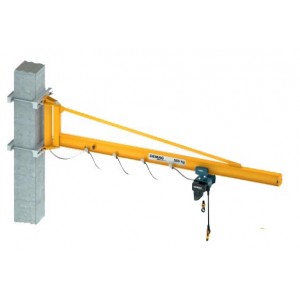
Large-scale industrial lifting and displacement of bulk loads
can be done using two major pieces of equipment, including overhead cranes and
overhead hoists. Despite the similarity in their purposes, there are
significant differences between these two that make them suitable for different
tasks. This blog post will explore the main features and benefits of each to
help you decide which one will suit your requirement.
In warehouses, factories, and other industrial facilities that deal with large and heavy products, it is not uncommon to see overhead cranes being used here. These systems consist of a bridge spanning the width of a building with a hoist and trolley on top of it. These bridges move along rails/runways allowing the hoist/trolley to cover a wide area.
The foremost benefit with above the ground cranes is their capacity to lift heavier loads. They can handle anything from several tons up to over 100 tons making them ideal for heavy duty applications like steel fabrication, automotive manufacturing, or shipbuilding among others. Overhead cranes / jib crane also provide a great deal of flexibility as they are customisable through various bridge spans, heights for lifting as well as hoist configurations among other things depending on what one wants.
Another merit associated with above the ground cranes is
enhancement of material handling processes. Through providing easy reachability
within an entire facility, such cranes will reduce significantly the time taken
to transport materials from one place to another. This increased productivity
leads to lower costs or higher efficiency levels.
On the contrary, compared to above ground cranes, above head hoists are smaller sized units which are more compact. They include motorised lifting devices mounted on either fixed beams or movable trolleys traveling along single rails/tracks only. Overhead hoists usually find application in workshops where accurate lifting and positioning is required.
The main benefit with overhead hoists is that they have a small footprint. Since they need only one beam or track, installing them in areas where the number of headspaces is limited or space on the ground is less would be ideal. Therefore, when there are low ceiling heights or congested plant layout conditions overhead hoists make sense.
Another advantage of overhead hosts is their high precision and control. With variable speed drives, finely tuned controls and anti-sway systems for instance, operators can accurately position loads. This feature is critical especially in situations like engine assembly or machine maintenance where delicate components must be handled with utmost care.
Overhead hoists are also adaptable as they can take on
different types of loads through various attachments such as hooks, slings,
grabs, and vacuum lifters amongst others. This makes them more versatile thus
usable across industries such as food processing right up to aerospace
manufacturing.
When it comes to choosing between an above-ground crane and an above-the-head hoist, your specific requirements for lifting should be considered first. Overhead cranes may offer the best solution if you want to handle heavy weights over a wide area. However, in cases where space is limited yet precise lifting and positioning are required then maybe it would be more practical to go for an overhead hoist instead.
Every lifting application is unique at Lifting Gear Direct; hence, the reason we have an assorted range of overhead cranes and hoists to suit our wide clientele base. Our experienced team can help you analyse your needs and advice a suitable solution for your business.
When it comes to ensuring safety and efficiency during
operations, then purchasing high standard lifting equipment such as overhead
crane or overhead hoist becomes paramount. Opting to work with recognised
supplier such as Lifting Gear Direct will ensure that you get the best
machinery along with support for smooth running of your business.